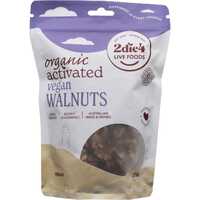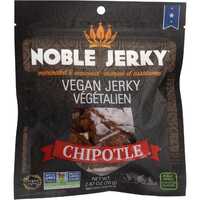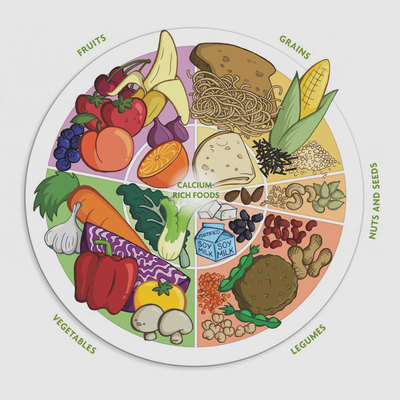So, you want to go vegan. Good for you! While telling people about your vegan intentions would once upon a time elicit a few eye-rolls and concerned eye-brow raises, these days, it’s becoming increasingly more accepted and popular. Whether you’re choosing to become a vegan for ethical or environmental reasons, or simply because you want to try and adopt a healthier, more plant-based diet, you’ve come to the right place.
When deciding to go vegan, the amount of information out there can be a little overwhelming, especially if you’re a beginner. That’s why we’ve put together this short beginner’s guide to going vegan. While we won’t cover absolutely everything that’s involved with going vegan, we will be covering the essentials to help make your transition to veganism that much easier.
What Does It Mean to Be Vegan?
While some people believe the word vegan is short for vegetarian, this is actually not the case. A vegan diet plan focuses on plant-based foods and drinks, and eliminates all animal products and by-products, including eggs and dairy. Veganism is rooted in the belief that no living being or creature should be harmed or eaten. In terms of food, being a vegan means replacing poultry, fish, meat and dairy with vegetables, fruits, beans, nuts and grains. However, veganism is about much more than consuming a purely plant-based diet. For the purpose of this beginner’s guide, however, we will just be talking about how to become a vegan nutritionally. Yet just as a side note, veganism actually goes beyond the food you put into your mouth. For many, veganism is a lifestyle, and affects not only the food you eat, but the products you use, the clothes you wear and more.
Why Go Vegan?
As we’ve talked about, there are many reasons people go vegan. And, there’s plenty of scientific evidence out there on the incredible benefits of adopting a vegan diet. From the personal health benefits, to reducing your carbon footprint, to generally helping make the world a more harmonious and peaceful place, there are countless benefits to going vegan. Let’s take a deeper look.
Going Vegan for Yourself
Research shows that eating a balanced and varied vegan diet can significantly improve your health. Contrary to popular belief, adopting a vegan diet doesn’t automatically make you healthy. After all, oreos are vegan, and we all know oreos aren’t exactly the most nutritionally dense food. You can still be an ‘unhealthy’ vegan, especially if your diet mainly consists of bread, pasta and rice (all of which are vegan). However, vegans who do focus on eating real, unprocessed whole foods can enjoy health benefits such as:
- Lowered risk of diabetes and heart disease
- Better digestion
- Weight loss
- Improve blood pressure
- Less inflammation in the body
- Improved sleep
Going Vegan for Ethical Reasons
Perhaps the most common reason for adopting a vegan diet is the ethical element. Many people go vegan because they believe no animal or being should be harmed in any way, shape or form. Veganism has a strong empathy and kindness element, and the desire to prevent any animal slaughtering or suffering is a major factor for many people who decide to go vegan.
Going Vegan to Save the Planet
Want to save the planet? Go vegan. No, really. Research suggests that going vegan is one of the best ways to save the planet. Veganism has been shown to contribute to the least amount of water wastage, deforestation and greenhouse gas emissions, which largely comes from large-scale meat production.
What You Can’t Eat on a Vegan Diet Plan
OK, let’s get this out of the way first. When adopting a vegan diet plan, here is what you will no longer be eating:
- Animal proteins: Poultry, beef, pork and seafood.
- Dairy and eggs: These are animal by-products, and are also off the table when going vegan.
- Animal fats: Any type of animal fat is off-limits.
- Bee products: Honey is not allowed on a vegan diet.
The thing many people worry about when going vegan is that they won’t be consuming an adequate amount of protein. While yes, it does require more thought and organisation in the kitchen, it’s actually really easy to consume enough protein as a vegan, it will just be a different type of protein to what you’re used to. Swap your meats for these vegan alternatives: legumes, nut butters, tofu and quinoa.
What You Can Eat on a Vegan Diet Plan
Now onto the good stuff: here’s what you can eat on a vegan diet plan (it’s probably more than you thought!):
- All fruits and vegetables: Literally. All. The. Fruit. And. Veg. Yes, please!
- Grains and legumes: Worried you wouldn’t be able to eat bread? Think again. You can eat as much bread, pasta and rice as your heart desires. Also, say hello to legumes (chickpeas, lentils, beans – your new protein BFF).
- Nuts and seeds: Peanut butter. Need we say more?
- Tofu and tempeh: Tofu ‘egg’ scramble, anyone?
- Plant-based oils and natural sweeteners: Avocado or coconut oil, and natural sweeteners like coconut sugar (yum), maple syrup, agave nectar and more.
If you’re worried about your essential vitamins and minerals intake, many vegans opt to include fermented foods into their diet like seaweed, sauerkraut and miso paste. You can also add some nutritional yeast (an awesome cheese-flavoured substitute) for an extra boost of vitamin B12.
Shameless plug:-) In case you didn't know, at Healthy Being we've made it exceptionally easy to find vegan friendly products - with over 1,000 natural and organic vegan products, ranging from superfoods, snacks, vitamins, foods and body & beauty products!
5 Top Tips for Successfully Adopting a Vegan Diet Plan
1. Start Slowly
Transitioning to a vegan diet takes time and patience. You might be successfully eating vegan for a week, and then accidentally or unknowingly consume something that isn’t vegan. This is not an excuse to give up! Be kind with yourself and be patient. It’s a process, but you’re on the right track. After all, veganism is about being kind to animals and the planet, so it’s important you’re kind to yourself too.
2. Swap Non-Vegan Foods for Vegan Alternatives
Swap your scrambled eggs for scrambled tofu, or bean-based burger patties instead of beef. There’s always a way to turn a non-vegan food into a vegan recipe – you just need to get creative. It’s also handy to subscribe to blogs or follow people on social media who are vegan. They will often provide tips and tricks, delicious vegan recipes and lots of inspiration when it comes to going vegan.
3. Learn How to Read Food Labels
While you can be certain that all fruits and veg are vegan, when buying pre-packaged foods, it’s important you learn how to read food labels. While bread is inherently vegan, some breads are topped with an egg wash, and some doughs contain egg yolk or honey. Also, when buying sweet snacks, you want to look out for foods containing gelatine, which is animal fat.
The good news is these days, most supermarkets have a dedicated health food section, which usually features plenty of vegan-friendly options. However, it’s always a good idea to read food labels just to make sure there are no sneaky non-vegan ingredients (some common ingredients include: castroeum, casein, lactose, rennet, shellac and whey).
4. Focus on What You Can Eat, Not What You Can’t
The mistake many people make when going vegan is focusing too much on all the things they are no longer able to eat. It’s human nature to rebel against being told what you can’t do, which makes it harder for you in the long run to stick to a vegan diet. So, instead of focusing on the foods you will no longer be consuming, think about everything you can eat (hello fresh fruit and veg, delicious nut butters and creamy almond milk!)
5. Find a Vegan Buddy
You know how going to the gym is so much easier when you’ve got a buddy to go with? Becoming vegan is the same. The thing is, no major lifestyle change is easy to do alone. That’s why finding a buddy who is also wanting to try adopt a vegan diet will make you that much more committed. It’s also more fun when you have someone to swap vegan recipes with and chat about how great you feel on your vegan diet plan!
We hope this guide has provided you with some helpful tips and tricks for going vegan! Remember: take it slow, be kind with yourself and just know you’re doing a great thing for yourself, all animals, and our planet.
...and remember, qualified nutritionists at Healthy Being are available to offer further general advice to help guide you in selecting the right products. So please, feel free to contact us at any time!
 Dr Peter Succar heads up the Product Research Team at Healthy Being and is an enthusiastic Health & Fitness Lifestyle Coach. He's passionate about helping others obtain optimum health, advocating realistic and achievable changes in diets and lifestyles that promote the body’s natural immunity, its ability to self-heal and achieve overall mental and physical well-being.
Dr Peter Succar heads up the Product Research Team at Healthy Being and is an enthusiastic Health & Fitness Lifestyle Coach. He's passionate about helping others obtain optimum health, advocating realistic and achievable changes in diets and lifestyles that promote the body’s natural immunity, its ability to self-heal and achieve overall mental and physical well-being.


 Certified Organic
Certified Organic Vegan Friendly
Vegan Friendly  Vegetarian
Vegetarian Organic Ingredients
Organic Ingredients Dairy Free
Dairy Free Gluten Free
Gluten Free Keto Friendly
Keto Friendly
































